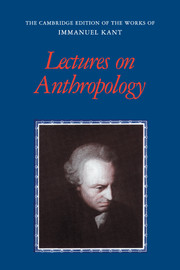Book contents
- Frontmatter
- Contents
- General editors’ preface
- Preface
- Abbreviations
- General introduction
- Anthropology Collins 1772–1773
- Anthropology Parow 1772–1773
- Translator's introduction
- Lecture of the Winter Semester 1772–1773 based on the transcriptions of Parow, Euchel, Brauer, Hamilton, Philippi, Collins and Dohna
- Anthropology Friedländer 1775–1776
- Anthropology Pillau 1777–1778
- Menschenkunde (1781–1782?)
- Anthropology Mrongovius (1784–1785)
- Anthropology Busolt, 1788–1789
- Editorial notes
- Glossary
- Bibliography
- Index
Translator's introduction
Published online by Cambridge University Press: 05 April 2013
- Frontmatter
- Contents
- General editors’ preface
- Preface
- Abbreviations
- General introduction
- Anthropology Collins 1772–1773
- Anthropology Parow 1772–1773
- Translator's introduction
- Lecture of the Winter Semester 1772–1773 based on the transcriptions of Parow, Euchel, Brauer, Hamilton, Philippi, Collins and Dohna
- Anthropology Friedländer 1775–1776
- Anthropology Pillau 1777–1778
- Menschenkunde (1781–1782?)
- Anthropology Mrongovius (1784–1785)
- Anthropology Busolt, 1788–1789
- Editorial notes
- Glossary
- Bibliography
- Index
Summary
Kant began lecturing on Anthropology in the winter of 1772–1773. The earliest transcriptions of these lectures that have come down to us are the Collins text and the Parow text. Both are fairly extensive: Parow, at about 225 pages, is just a bit shorter than Collins. Like Collins, it is a compilation from notes taken by seven transcribers (Collins and Parow were contributors to both). Since both Collins and Parow are apparently accounts of the same lecture course, the differences between them may enable us to gauge the extent to which the contents of these transcriptions reflect the transcribers’ choices. Like Collins, Parow begins with an introductory and methodological section, but the Parow introduction makes more explicit the focus of attention on empirical psychology (in Baumgarten's sense of the term). It too follows the general account of human faculties – theoretical cognition, taste, and desire (though the Parow account focuses more exclusively on character).
The brief selections translated here are taken from the introduction and from the opening remarks about character near the end of the text.
Information
- Type
- Chapter
- Information
- Lectures on Anthropology , pp. 29 - 30Publisher: Cambridge University PressPrint publication year: 2012
